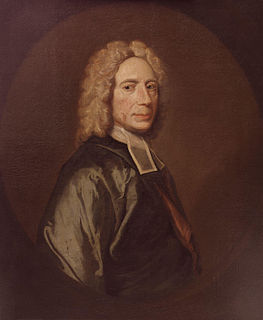A Quote by Francois de La Rochefoucauld
We label judges with having the meanest motives, and yet we desire that our reputation and fame should depend upon the judgment of men, who are all, either from their jealousy or preoccupation or want of intelligence, opposed to us - and yet despite their bias, just for the sake of making these men decide in our favor, we peril in so many ways both our peace and our life.
Related Quotes
Peace should be a hallmark of the godly person, first because it is a Godlike trait: God is called the God of peace several times in the New Testament. He took the initiative to establish peace with rebellious men, and He is the author of both personal peace as well as peace among men. Peace should be part of our character also because God has promised us His peace, because He has commanded us to let peace rule in our lives and relationships, and because peace is a fruit of the Spirit and therefore an evidence of His working in our lives.
The love of God again makes us free, for it draws us to set a low value on those things wherein we are subject to others - our wealth, our position, our reputation, and our life - and to set a high value on those things which no man can take from us - our integrity, our righteousness, our love for all men, and our communion with God.
And when at some future date the high court of history sits in judgment on each of us, recording whether in our brief span of service we fulfilled our responsibilities to the state, our success or failure, in whatever office we hold, will be measured by the answers to four questions: First, were we truly men of courage... Second, were we truly men of judgment... Third, were we truly men of integrity... Finally, were we truly men of dedication?-
We are warned by the Word both of our duty, our danger, and our remedy. On the sea of life there would be many more wrecks if it were not for the divine storm-signals which give to the watchful a timely warning. The Bible should be our Mentor, our Monitor, our Memento Mori, our Remembrancer, and the Keeper of our Conscience.
When we can't hold back, or set boundaries, on what comes from our lips, our words are in charge-not us. But we are still responsible for those words. Our words do not come from somewhere outside of us, as if we were a ventriloquist's dummy. They are the product of our hearts. Our saying, "I didn't mean that," is probably better translated, "I didn't want you to know I thought that about you." We need to take responsibility for our words. "But I tell you that men will have to give account on the day of judgment for every careless word they have spoken" (Matt. 12:36).
I want to stay active. I want to find that mind-body connection every single day, and I want other people to have that because we spend our lives on our phones, at our desks. We're not thinking about our bodies and the mental connections we should be having, and those moments help us push through to live our best life.
God is not concerned about our plans; He doesn’t ask, “Do you want to go through this loss of a loved one, this difficulty, or this defeat?” No, He allows these things for His own purpose. The things we are going through are either making us sweeter, better, and nobler men and women, or they are making us more critical and fault-finding, and more insistent on our own way. The things that happen either make us evil, or they make us more saintly, depending entirely on our relationship with God and its level of intimacy.
Our conduct has a direct influence on how people think about the gospel. The world doesn't judge us by our theology; the world judges us by our behavior. People don't necessarily want to know what we believe about the Bible. They want to see if what we believe makes a difference in our lives. Our actions either bring glory to God or misrepresent His truth.
An affectionate disposition not only makes the mind more peaceful
and calm, but it affects our body in a positive way too. On the
other hand, hatred, jealousy and fear upset our peace of mind, make
us agitated and affect our body adversely. Even our body needs peace
of mind and is not suited to agitation. This shows that an
appreciation for peace of mind is in our blood.



































